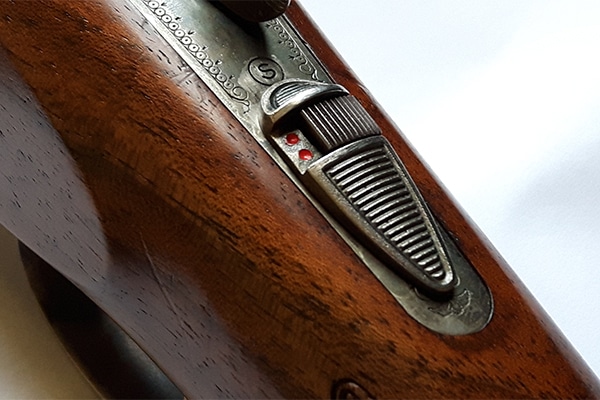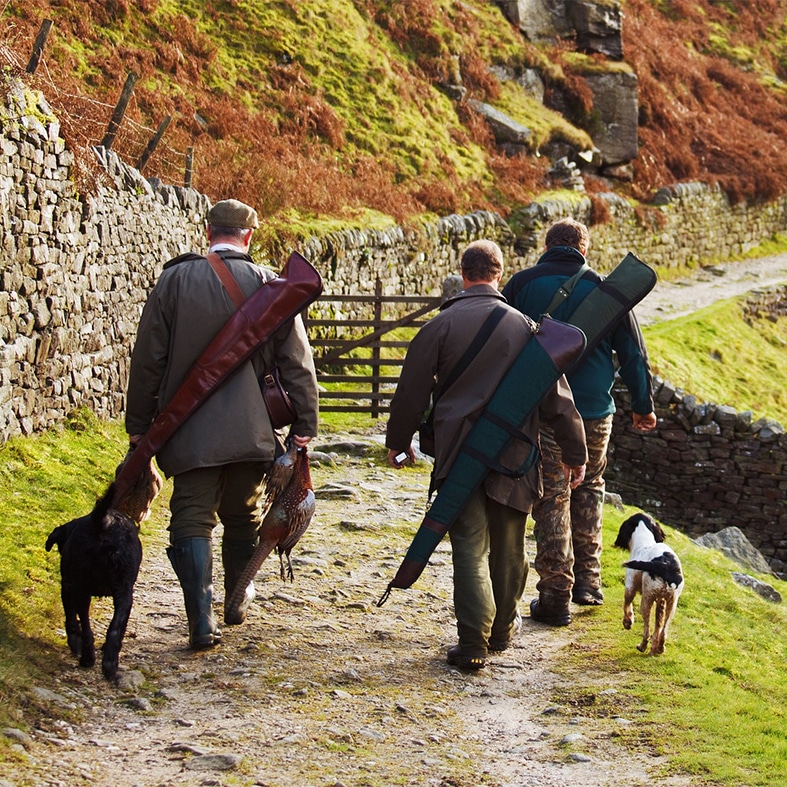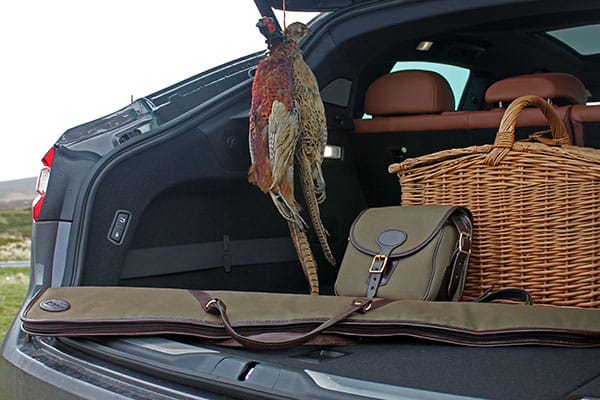
Possession of firearms, shotguns, airguns and ammunition by under-18s
Information on age restrictions for the possession of firearms, shotguns and airguns by under-18-year-olds, including those guns as a gift.
Get information on the legal shooting season for mammals and birds in the UK.
Learn about our current conservation projects and how you can get involved.
Comprehensive information and advice from our specialist firearms team.
Everything you need to know about shotgun, rifle and airgun ammunition.
Find our up-to-date information, advice and links to government resources.
Everything you need to know on firearms law and licensing.
All the latest news and advice on general licences and how they affect you.


Firearms Firearms security Firearms security advice
As the holder of a firearm or shotgun certificate you are required to comply with the conditions on your certificate relating to security. These are conditions 4 (a) &(b).
Condition 4 (a)
“The firearms and ammunition to which the certificate relates must at all times (except in the circumstances set out in paragraph (b) below) be stored securely so as to prevent, so far as is reasonably practicable, access to the firearms or ammunition by an unauthorised person; ”
Condition 4 (b)
“Where a firearm or ammunition to which the certificate relates is in use or the holder of the certificate has the firearm with him for the purpose of cleaning, repairing or testing it or for some other purpose connected with its use, transfer or sale, or the firearm or ammunition is in transit to or from a place in connection with its use or any such purpose, reasonable precautions must be taken for the safe custody of the firearm or the ammunition.”
Condition 4 (a)
The wording is exactly as for Firearms, except …“access to the guns by an unauthorised person.”
Condition 4 (b)
The wording is exactly as for firearms BUT for “firearm” reads “shotgun” and note that the condition does NOT include shotgun ammunition.
As you can see the rules are the same for both firearms and shotguns, except for the requirement to store firearm ammunition (Section 1) securely.
There is NO statutory requirement for cabinets, separate storage of rifle bolts, nor special locks, nor burglar alarms: Each case must be judged on its individual merits. However, you should always take reasonable precautions for the safe storage of your guns – and a properly fixed gun cabinet will usually offer the most cost-effective method.
Additional advice can be found in the Home Office Security Handbook 2020
The term “take reasonable precautions for the safe custody” is used consistently within the Firearms Acts 1968 – 1997 and the Firearms Rules 1998 when referring to firearms and ammunition. The same expression appears within the Statutory Conditions on firearm, shotgun, registered firearm dealers’ certificates and visitor and temporary permits. There is also similarity of language within the Home Office publication “Firearms Law: Guidance to the Police 2002.”
While the Home Office guidance has no statutory basis, it is widely regarded as being a manual for the proper administration of firearms licensing. All chief officers within Great Britain agreed to its adoption when it was first issued. In BASC’s experience, the guidance carries considerable weight in the courts and has comparable status to an Approved Code of Practice (ACOP) in health and safety legislation.
Conditions 4(a) on a firearm and shotgun certificate provides a duty to the holder to keep their firearms secure while not in use. Condition 4(b) covers firearms and shotguns which are either in use, in transit or are away from a more permanent place of storage. The Firearms Rules 1998 provides these conditions and their language is identical, save for the differing mention of shotguns and firearms and ammunition to which section 1 apply.
“So far as is reasonably practicable” – used in condition 4 (a) applies to a permanent form of storage when a gun is not in use, eg. locked in a steel gun cabinet.
The statutory condition for this is written in different terms: “The firearms and ammunition to which the certificate relates must at all times (except in the circumstances set out in paragraph (b) below be stored securely so as to prevent, so far as is reasonably practicable, access to the firearms and ammunition by an unauthorised person”. In this case the duty that falls upon the certificate holder is to store his gun securely to prevent access by unauthorised persons “so far as is reasonably practicable”.
This duty in condition 4(b) is defined by the phrase “reasonable precautions must be taken for the safe custody”. It flows from this that there is no absolute duty to ensure the safe custody of any firearm or ammunition. However, an offence will have been committed by a certificate holder who fails to take reasonable precautions against the occurrence of a loss of a firearm in his care.
It is a fundamental tenet of UK law that the term “reasonable” is a generic expression which applies to a particular situation, ie. it is case specific. It may be defined as the standard of care taken by a prudent person having due regard to any risks to try to prevent the loss of items entrusted to him. The phrase conveys a sense of what might be described as a legitimate expectation by anyone who examines the circumstances of a loss against the precautions that had been set in place to prevent it.
Appendix 6 of the guidance sets out those conditions which the Home Office considers to be desirable to be appended to the registration certificates of firearms dealers. Condition 1 is recommended for inclusion with all new registrations. It states: “reasonable measures shall be taken to maintain the safe keeping of all firearms and ammunition dealt with or kept in the course of the Registered Firearms Dealer’s business”.
Appendix 11 deals with conditions for visitor’s firearm or shotgun permits. This reproduces condition 4 (b) from firearm and shotgun certificates in its entirety.
This is an entirely different duty and one which is much more stringent than the condition used when firearms are in use or transit. It is clear from this that parliament recognised that when guns and ammunition were in use or transit etc, they should be subject to a less stringent duty of care than when they were not in use and secured in some form of permanent security measure. The phrase “reasonably practicable” means that any risk has to be weighed against the measures necessary to eliminate it.
The Home Office guidance offers advice to certificate holders as to how they might take practical measures to comply with the statutory requirement to take reasonable precautions for the safe custody of their firearms when they are in use or transit.
Paragraph 19.47 of the guidance recommends “Any guns should be hidden, preferably in the locked boot or other secured load carrying area of the vehicle where practicable. Vehicles used frequently for transporting firearms should ideally have an immobiliser and/or alarm fitted, if the firearms are to be left unattended.”
Paragraph 19.48 goes on to recommend “If the vehicle is left unattended for any reason, firearms should be concealed, preferably in the locked luggage compartment and (where practicable), an essential component such as the bolt or foreend removed and kept in possession of the responsible person. Where possible any ammunition should be stored separately from the firearm and this too should be concealed from view. The vehicle should be locked, and any immobiliser or alarm should be set. If possible, the vehicle should be parked within the sight of the responsible person”. However, this advice is qualified in that it need only be done “if practicable”.
It is clear from this that the Home Office envisages that certificate holders will take sensible but rudimentary precautions to safeguard their firearms whilst travelling. It is instructive to note that the Home Office does not require some form of secure container or other restraint to be fitted to the vehicle. The vehicle’s fabric, its locks plus concealment of the firearm is considered sufficient.
The security requirement relates to all firearms, sound moderators and ammunition held on a firearm certificate. On a shotgun certificate it only relates to the shotguns, not cartridges. However, it makes sense to keep them hidden away and well away from your shotgun storage.
In practice, this means that when you’re not using your guns, they should be locked away from anyone who doesn’t have a certificate. This includes family members. Undoubtedly the best option is a purpose-built gun cabinet.
Your gun cabinet should be secured firmly so that it can’t easily be removed – usually by bolting it to a wall, floor or joists. It is best secured in a corner to make it difficult for a thief to attack it.
You should ensure that you keep the keys to the cabinet in a place where they can’t be found easily. Remember that you are responsible for the security of the guns, and letting people who do not have a certificate (including family members) know where the keys are, is not taking reasonable precautions to ensure that they don’t have access.
Criminals are aware of the habit of “hiding” keys in a drawer, so think carefully about the hiding place. It would be sensible to consider changing that hiding place from time to time.
Another option is to put the keys into a small combination safe – for which only you have the combination. Another option is a gun safe with a combination lock. Equal care should be taken to prevent anyone else knowing the access codes.
When you come in from shooting, it’s best to clean your guns immediately then put them into their cabinet and lock them away as soon as possible. Leaving guns out “to dry” could compromise security. Modern lubricants and water-dispersants have made drying simple and quick.
When you return from a shoot make sure you haven’t dropped any ammunition in your car or left any in the glove compartment or door pockets.
Check your own pockets to ensure that you haven’t left any there as well and put it all in your separate ammunition storage.
There will be many occasions when you need to take your guns out for other reasons, and again the same applies – make sure you don’t leave them lying around and put them back in secure storage when you’ve finished.
If you have any doubt, remember that as a BASC member, you can call on the BASC firearms team for help and advice on the subject. Call 01244 573 010 or email us.
The Home Office has published a handbook which provides detailed advice on firearm security – which can be found here.
Remember it is your responsibility to ensure that unauthorised people don’t have access to your guns. It is an offence if you fail to do so, and you could be prosecuted and have your certificate revoked if you are careless in this respect.
We each have a responsibility to make sure guns do not fall into the wrong hands.
Got a question? Email us on firearms@basc.orq.uk or call 01244 573 010.
© BASC July 2023

Information on age restrictions for the possession of firearms, shotguns and airguns by under-18-year-olds, including those guns as a gift.

Explaining the legalities around shooting and rights of way in England and Wales, including access to shooting land and advice for landowners.

Tim Ryan of Warners solicitors explores the subject of guns in vehicles and the police’s stop and search procedure.
Sign up to our weekly newsletter and get all the latest updates straight to your inbox.
© 2023 British Association for Shooting and Conservation. Registered Office: Marford Mill, Rossett, Wrexham, LL12 0HL – Registered Society No: 28488R. BASC is a trading name of the British Association for Shooting and Conservation Limited which is authorised and regulated by the Financial Conduct Authority (FCA) under firm reference number 311937.
If you have any questions or complaints about your BASC membership insurance cover, please email us. More information about resolving complaints can be found on the FCA website or on the EU ODR platform.
This website uses cookies so that we can provide you with the best user experience possible. Cookie information is stored in your browser and performs functions such as recognising you when you return to our website and helping our team to understand which sections of the website you find most interesting and useful.
Strictly Necessary Cookie should be enabled at all times so that we can save your preferences for cookie settings.
If you disable this cookie, we will not be able to save your preferences. This means that every time you visit this website you will need to enable or disable cookies again.
This website uses Google Analytics to collect anonymous information such as the number of visitors to the site, and the most popular pages.
Keeping this cookie enabled helps us to improve our website.
Please enable Strictly Necessary Cookies first so that we can save your preferences!
More information about our Cookie Policy